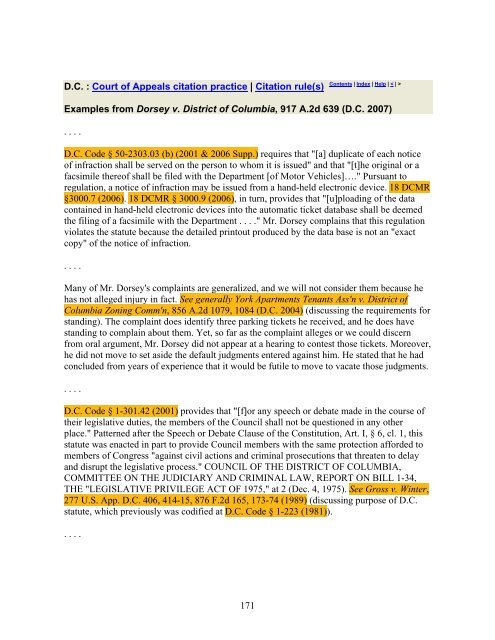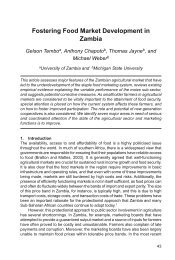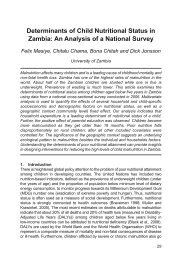Introduction to Basic Legal Citation - access-to-law home
Introduction to Basic Legal Citation - access-to-law home
Introduction to Basic Legal Citation - access-to-law home
Create successful ePaper yourself
Turn your PDF publications into a flip-book with our unique Google optimized e-Paper software.
D.C. : Court of Appeals citation practice | <strong>Citation</strong> rule(s)<br />
171<br />
Contents | Index | Help | < | ><br />
Examples from Dorsey v. District of Columbia, 917 A.2d 639 (D.C. 2007)<br />
. . . .<br />
D.C. Code § 50-2303.03 (b) (2001 & 2006 Supp.) requires that "[a] duplicate of each notice<br />
of infraction shall be served on the person <strong>to</strong> whom it is issued" and that "[t]he original or a<br />
facsimile thereof shall be filed with the Department [of Mo<strong>to</strong>r Vehicles]…." Pursuant <strong>to</strong><br />
regulation, a notice of infraction may be issued from a hand-held electronic device. 18 DCMR<br />
§3000.7 (2006). 18 DCMR § 3000.9 (2006), in turn, provides that "[u]ploading of the data<br />
contained in hand-held electronic devices in<strong>to</strong> the au<strong>to</strong>matic ticket database shall be deemed<br />
the filing of a facsimile with the Department . . . ." Mr. Dorsey complains that this regulation<br />
violates the statute because the detailed prin<strong>to</strong>ut produced by the data base is not an "exact<br />
copy" of the notice of infraction.<br />
. . . .<br />
Many of Mr. Dorsey's complaints are generalized, and we will not consider them because he<br />
has not alleged injury in fact. See generally York Apartments Tenants Ass'n v. District of<br />
Columbia Zoning Comm'n, 856 A.2d 1079, 1084 (D.C. 2004) (discussing the requirements for<br />
standing). The complaint does identify three parking tickets he received, and he does have<br />
standing <strong>to</strong> complain about them. Yet, so far as the complaint alleges or we could discern<br />
from oral argument, Mr. Dorsey did not appear at a hearing <strong>to</strong> contest those tickets. Moreover,<br />
he did not move <strong>to</strong> set aside the default judgments entered against him. He stated that he had<br />
concluded from years of experience that it would be futile <strong>to</strong> move <strong>to</strong> vacate those judgments.<br />
. . . .<br />
D.C. Code § 1-301.42 (2001) provides that "[f]or any speech or debate made in the course of<br />
their legislative duties, the members of the Council shall not be questioned in any other<br />
place." Patterned after the Speech or Debate Clause of the Constitution, Art. I, § 6, cl. 1, this<br />
statute was enacted in part <strong>to</strong> provide Council members with the same protection afforded <strong>to</strong><br />
members of Congress "against civil actions and criminal prosecutions that threaten <strong>to</strong> delay<br />
and disrupt the legislative process." COUNCIL OF THE DISTRICT OF COLUMBIA,<br />
COMMITTEE ON THE JUDICIARY AND CRIMINAL LAW, REPORT ON BILL 1-34,<br />
THE "LEGISLATIVE PRIVILEGE ACT OF 1975," at 2 (Dec. 4, 1975). See Gross v. Winter,<br />
277 U.S. App. D.C. 406, 414-15, 876 F.2d 165, 173-74 (1989) (discussing purpose of D.C.<br />
statute, which previously was codified at D.C. Code § 1-223 (1981)).<br />
. . . .




